Career Change Cover Letters: A Comprehensive Guide
In the eyes of some hiring managers, embarking on a new career path is difficult to justify. Here's how to present your professional change in the best light.
While the usefulness of a cover letter is debatable, it’s an indispensable selling point if you’re entering a new field.
Career changers may have a hard time making it past the initial application.
For example, some hiring managers won't understand how your work history fits their needs, so you must connect the dots for them. Others might perceive a candidate with a linear career trajectory as a “safer” bet -- even for an entry-level position.
Overcome their qualms with a well-written cover letter that touts your transferable skills and explains the “why” behind your career change.
Switching careers demands a high risk tolerance and exceptional work ethic (perhaps you studied nights and weekends while holding down a full-time job), so don’t underplay it. Forging a new path is unique-- most people simply drift into careers according to their college major or because of a referral from a friend or family member. Use your unique career transition story to emphasize your commitment, organizational skills and passion for your chosen field.
Even if your resume lacks the work experience a hiring manager is looking for, a strong portfolio of related projects and demonstrable soft skills can help you rise above candidates who have years of experience in the industry.
In this article, we’ll go over a few general tips for how to write a career change cover letter, followed by templates for specific scenarios, such as switching industries or pursuing a job that diverges from your college major.
Tips for Writing a Career Change Cover Letter
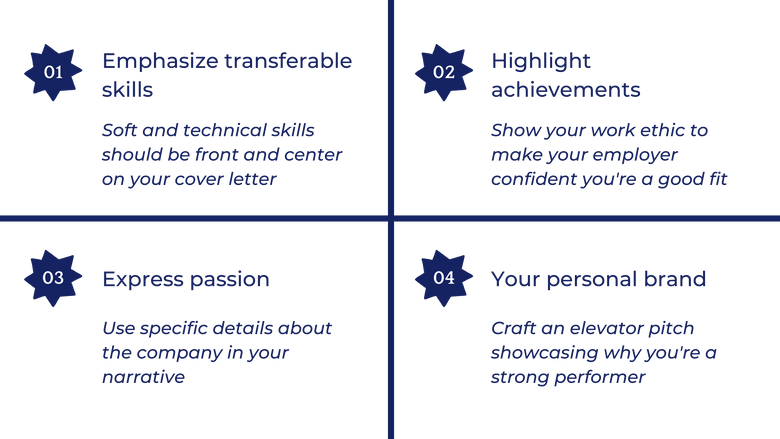
Emphasize your transferable skills
Analyze the job description and understand what skill set the position calls for. Use specific anecdotes from your work or academic history to illustrate some of those strengths in action. Make sure to finalize each anecdote with a summary of how you can use those skills in the role you’re applying for.
Soft Skills
The most obvious transferable skills include soft skills like teamwork, verbal and written communication skills, work ethic/initiative, organization and time management. However, consider how your technical background might make you a stronger candidate for the role, even if it’s seemingly unrelated. For example...
- A digital marketer applying for a data analytics role is already accustomed to using statistical analysis to evaluate and report on key marketing metrics.
- If you’re a software engineer seeking a product management role at a SaaS company, you know how to collaborate effectively with developers.
Technical Skills
Aside from transferable skills, consider whether you have the core technical skills required for the role. If the position requires certain credentials or certifications or has a steep learning curve -- like data science or software engineering -- mention your credentials first. Perhaps you graduated from a data science boot camp, completed a Master’s degree or obtained an IT certification. Hiring managers need to know you have the core competencies to fulfill the basic responsibilities of your role.
For Recent Graduates...
If you’re a fresh university or boot camp grad with no full-time work history in the field, mention passion projects, volunteer work or internships you’ve completed. On-the-job experience is exceedingly important for career switchers, especially in disciplines like UX design, software engineering and copywriting, where a strong portfolio matters more than your education background.
👉 Read next: Tie Your Strengths and Weaknesses to the Job Description
Highlight your top achievements in previous positions
This will also require a close look at the job posting to determine the skill set and work history they're looking for. In the cover letter, explain how you succeeded in previous roles and connect that to how you would add value in this position. Highlight tangible achievements like
- Performance metrics or KPIs you met or exceeded
- Times you assumed an increase in responsibility or complexity of responsibilities (whether or not a formal promotion was involved)
- Examples of ambiguous or high-pressure situations you assuaged
- New projects you initiated
- People you mentored
- Memorable things your coworkers or superiors said about you (make sure your references can back this up).
👉 Read Next: How to build your list of "career wins"
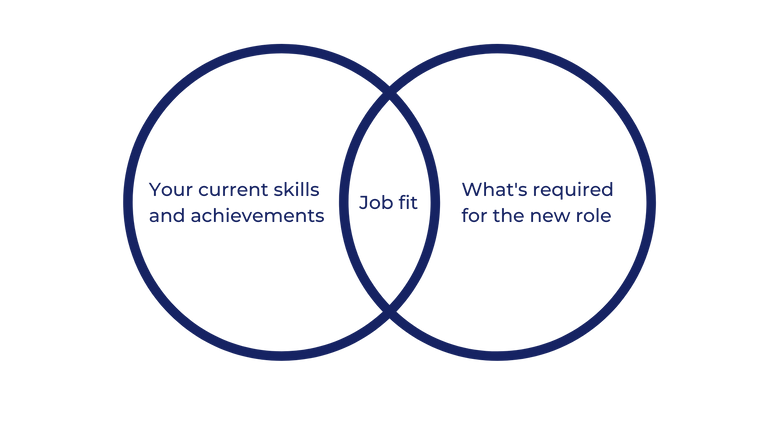
Express passion for the company
The higher-skilled an employee, the more expensive it is to lose them. This is why tech companies are adamant about hiring for mutual fit. They want the right person, someone who is passionate about the organization’s mission and the job opportunity, rather than someone who simply wants a job. Be deliberate in your job search, and spend time researching companies that matter to you. In your cover letter, explain why you chose them as a prospective employer, and how your goals jive with the company’s goals.
Introduce yourself and your personal brand
Make the opening sentence of your cover letter an elevator pitch, rather than the standard opener “I’m writing to you to apply for the position of X at Company Y.” Summarize who you are as a professional, what you’re passionate about, and what you can offer in 1-2 sentences. For inspiration, skim through the LinkedIn summaries of people you admire. The best LinkedIn profiles start with an attention-grabbing summary and leave a lasting impression of who the person is.
Perhaps you’re a psychology major looking for a UX design role where you can apply psychological principles to human-centered design. Or maybe you’re an administrative assistant who’s spent years managing appointments for a busy executive, and you’re seeking an account management role where you can apply your outstanding organization and time management skills.
Think of your elevator pitch as inventing a character. For example:
No matter what, don’t apologize for the experience you don’t have. Rather than saying “I know I don’t have any experience in recruiting,” say “Having worked as a career counselor helping high school students decide their future career path, I’m excited about the opportunity to help your company build an effective team.”
👉 Need help writing your career change resume? Check out this article
Templates for Specific Career Change Scenarios
There are countless reasons a candidate would leave their current role and enter a new industry. Make sure your job application thoroughly and accurately reflects your motivations. Here are three potential career change scenarios and cover letter templates to match.
You’re switching to a totally different role
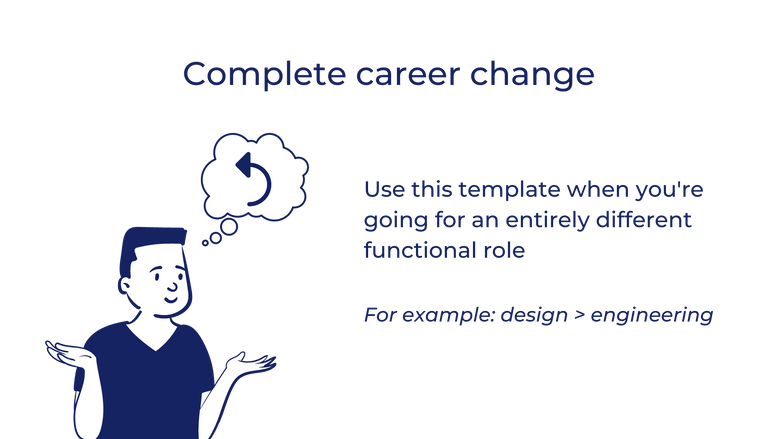
This might be you if you're vying for a new career path altogether. This is likely a new industry and a new job, for which you may have transferrable skills, but little to no direct experience.
Points to emphasize
- What you have to offer in terms of technical skills and transferable skills
- Why you made the career switch
- How you can add value, given your prior work history
Example Cover Letter
Dear Mr./Mrs./Ms. [Hiring manager’s surname],
I’m excited to apply for the role of UX designer at Company X. After several years spent working as a counselor for children with special needs, I discovered a fascination for human-centered design.
Putting the user first has always been at the heart of my work; I developed custom learning plans for children ages 14-17, communicated their progress with teachers and parents, and set up team-oriented activities for the children to develop their interpersonal skills.
During my five-year tenure at Forest North High School, I helped 80 percent of special needs children graduate on time, well above the 65 percent average.
Although I was able to make a major impact through my career in counseling, I would be thrilled to be considered for the UX design role at Company X. After completing a UX design boot camp from XYZ, I participated in an industry design project where I redesigned the user interface for a popular gaming mobile app to cater to a younger audience. By introducing gamification features like rewards points and weekly prizes, I was able to help the company increase in-app purchases by 75%.
I’m very interested in sharing how I can deliver UX design excellence at Company X. Can we schedule a call?
Best regards,
[Your Name]
You’re moving from one industry to another
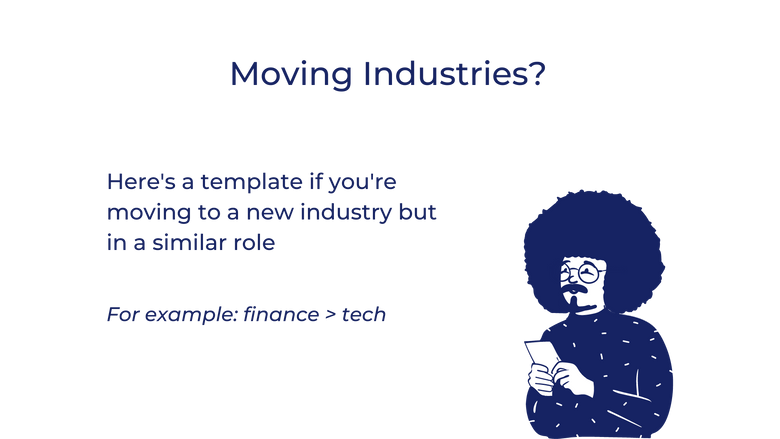
This might be you if you're pursuing job openings in a role you'd naturally be considered for. However, your potential employer belongs to an industry you have little to no experience in.
Points to emphasize
- How your prior industry knowledge applies to this industry
- What soft skills and technical skills from your prior role make you a superior candidate
Example Cover Letter
Dear Mr./Mrs/Ms. [Hiring manager’s surname],
Throughout my career as a software engineer at Facebook, I have impacted business outcomes by treating each software development project as a business problem to be solved. Gathering user requirements is the single most important step in the software development life cycle, which many developers underestimate.
At the start of each project, I made a point to sit in on meetings with the product manager to understand the project scope and business goals. As a result, I was entrusted with developing a customizable search feature, which reduced website bounce rate by 75%. I also mentored three junior developers who went on to become senior software engineers. During this time, I was promoted from senior software engineer to tech lead in a span of five years.
While I recognize that Facebook and Company X offer vastly different products, your company’s commitment to putting the user first and mission of improving access to healthcare is something I would be proud to be a part of.
As an engineer who has always put the user first, collaborated closely with product and design teams and knows the ins and outs of software development, I feel confident that I can make an impact as a product manager.
Kind regards,
[Your Name]
You're pursuing a role outside your major (entry level)
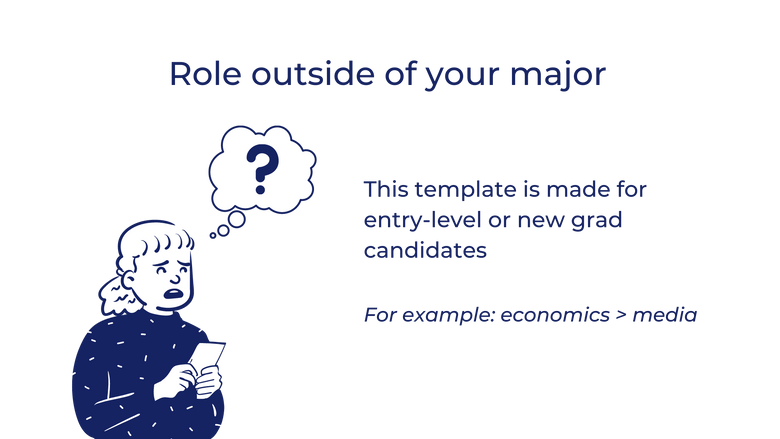
This might be you if you're a recent or soon-to-be graduate, especially from a less specialized, undergraduate program. You're in luck-- making a case for a "career change" at this stage of the game is nearly expected. Sometimes, you'll even gain special consideration for being a unique candidate.
Points to emphasize:
- Your reason for choosing a field different from your major
- Why you’re passionate about this field and what efforts you’ve made to learn more about it (eg: taking courses or internships, doing informational interviews with professionals in the field).
- Specific projects you’ve done that apply to the role
Example Cover Letter
Dear Mr./Mrs/Ms. [Hiring manager’s surname],
As a communications professional with two years of work experience helping startups grow their online presence using growth marketing tactics, I am delighted to apply for the role of brand associate at Company X.
While much of my work experience and academic history is focused on digital marketing, I developed a recent interest in branding and visual design. Earlier this year, I earned a certificate in Digital Design from The New School, with a focus on graphic and digital design. During my studies, I worked on a number of passion projects, which you will find on my portfolio site [insert URL].
Since acquiring my first Product X at the age of 10, I’ve always wanted to work at Company X, so I decided to create a mock campaign ahead of the November launch of Product Y to help the company appeal to an international audience. The redesigned logo, marketing slogans and brand guidelines represent Company X’s commitment to youth culture and freedom of expression.
Kind regards,
[Your Name]
The information provided herein is for general informational purposes only and is not intended to provide tax, legal, or investment advice and should not be construed as an offer to sell, a solicitation of an offer to buy, or a recommendation of any security by Candor, its employees and affiliates, or any third-party. Any expressions of opinion or assumptions are for illustrative purposes only and are subject to change without notice. Past performance is not a guarantee of future results and the opinions presented herein should not be viewed as an indicator of future performance. Investing in securities involves risk. Loss of principal is possible.
Third-party data has been obtained from sources we believe to be reliable; however, its accuracy, completeness, or reliability cannot be guaranteed. Candor does not receive compensation to promote or discuss any particular Company; however, Candor, its employees and affiliates, and/or its clients may hold positions in securities of the Companies discussed.
